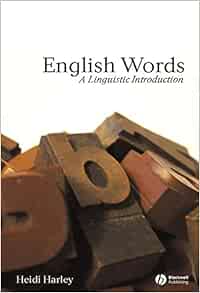Posted: Mar 04, 2022 10:55 am
1. Cognitive Discourse Analysis: An introduction - Thora Tenbrink
2. Cynical Theories: How Activist Scholarship Made Everything About Race, Gender And Identity- And Why This Harms Everybody – Helen Pluckrose and James Lindsay
3. A History of the World in 12 Maps – Jerry Brotton
4. Origins of the Specious: Myths and Misconceptions of the English Language – Patricia T. O’Connor & Stewart Kellerman
5. Peer Interaction and Second Language Learning - Jenefer Philip, Rebecca Adams & Noriko Iwashita
6. Eugene Onegin - Alexander Pushkin
7. Found in Translation: How Language Shapes Our Lives and Transforms the World - Nataly Kelly & Jost Zetzche
8. English Words: A Linguistic Introduction - Heidi Harley
296 pp.
Well, this one really knocked it out of the ball park. The book starts out with the question 'What is a word?' and then delves into the various ways in which we can answer this surprisingly difficult question. Assuming little or no familiarity with linguistics, the author describes the sound system of English and then moves onto the area of 'phonotactics' which is a description of the allowable sound combinations in English and gives a thorough explanation of why words like N'Djaema (Capital of Chad) or Mbappe (French soccer player) have word onset sound combinations which are not allowable in English, and why the words 'Thumb' and 'Knight' have strange spellings because of a change in phonotactics of English over the centuries.
There was also a very interesting section which cleared up argument structure for me - something I had always had a rather slippery grasp of. (Simply put, certain verbs take a single argument (John laughed) some have two arguments (John ate the cake) and some three (John gave the book to Mary.) The argument structure depends heavily on things like animacy, agency, change and experience...all very well described by Harley)
I can hardly give an adequate account of all of the topics covered in this book, so rich was the material. I re-read several sections a couple of times to get the maximum benefit and there was liberal use of post it notes.
An excellent read and thoroughly recommended for anyone who wants to look into linguistics and finds themselves beyond the merely interested layman or laywoman but not quite ready to jump into the deep end of a fully academic text for professionals.

2. Cynical Theories: How Activist Scholarship Made Everything About Race, Gender And Identity- And Why This Harms Everybody – Helen Pluckrose and James Lindsay
3. A History of the World in 12 Maps – Jerry Brotton
4. Origins of the Specious: Myths and Misconceptions of the English Language – Patricia T. O’Connor & Stewart Kellerman
5. Peer Interaction and Second Language Learning - Jenefer Philip, Rebecca Adams & Noriko Iwashita
6. Eugene Onegin - Alexander Pushkin
7. Found in Translation: How Language Shapes Our Lives and Transforms the World - Nataly Kelly & Jost Zetzche
8. English Words: A Linguistic Introduction - Heidi Harley
296 pp.
Well, this one really knocked it out of the ball park. The book starts out with the question 'What is a word?' and then delves into the various ways in which we can answer this surprisingly difficult question. Assuming little or no familiarity with linguistics, the author describes the sound system of English and then moves onto the area of 'phonotactics' which is a description of the allowable sound combinations in English and gives a thorough explanation of why words like N'Djaema (Capital of Chad) or Mbappe (French soccer player) have word onset sound combinations which are not allowable in English, and why the words 'Thumb' and 'Knight' have strange spellings because of a change in phonotactics of English over the centuries.
There was also a very interesting section which cleared up argument structure for me - something I had always had a rather slippery grasp of. (Simply put, certain verbs take a single argument (John laughed) some have two arguments (John ate the cake) and some three (John gave the book to Mary.) The argument structure depends heavily on things like animacy, agency, change and experience...all very well described by Harley)
I can hardly give an adequate account of all of the topics covered in this book, so rich was the material. I re-read several sections a couple of times to get the maximum benefit and there was liberal use of post it notes.
An excellent read and thoroughly recommended for anyone who wants to look into linguistics and finds themselves beyond the merely interested layman or laywoman but not quite ready to jump into the deep end of a fully academic text for professionals.
